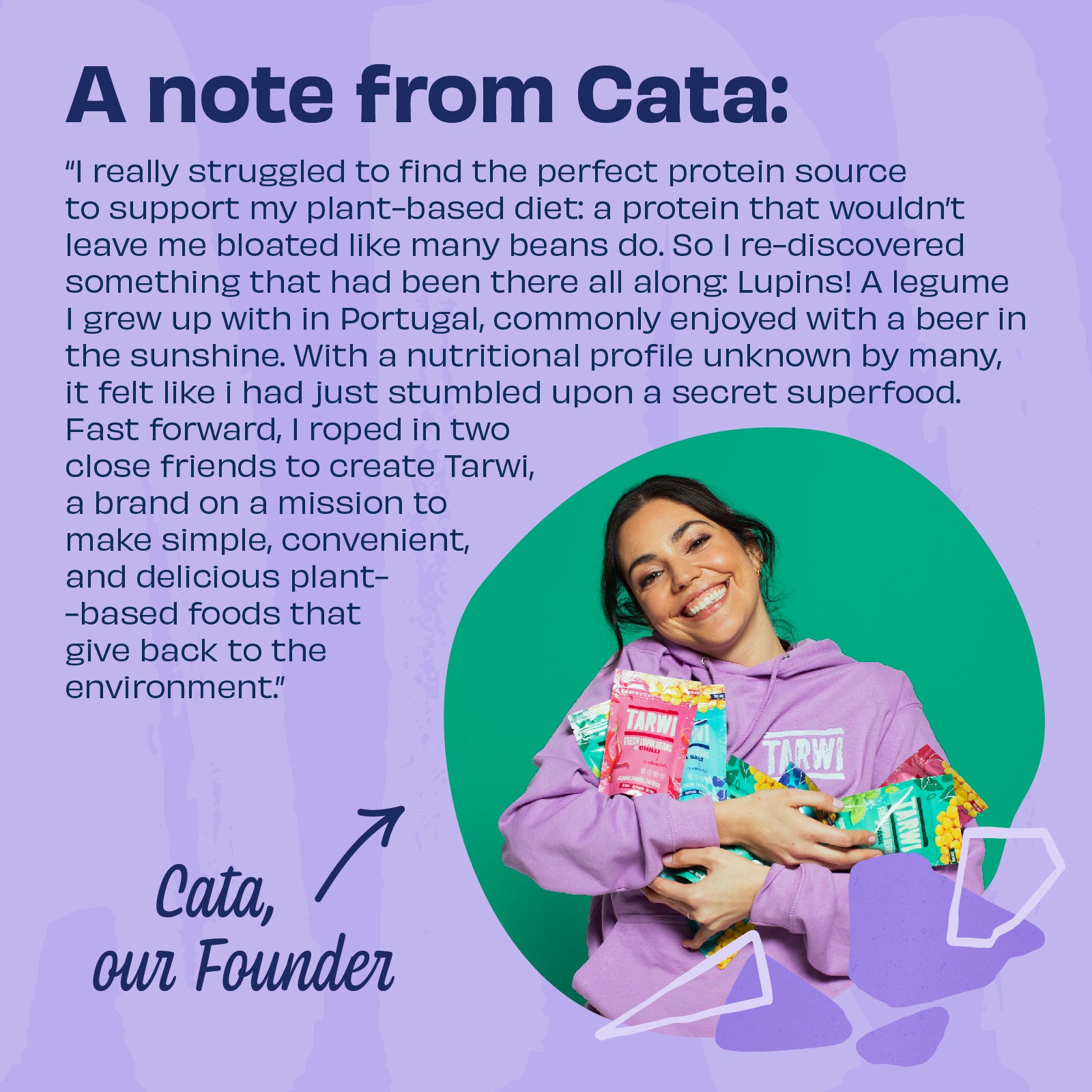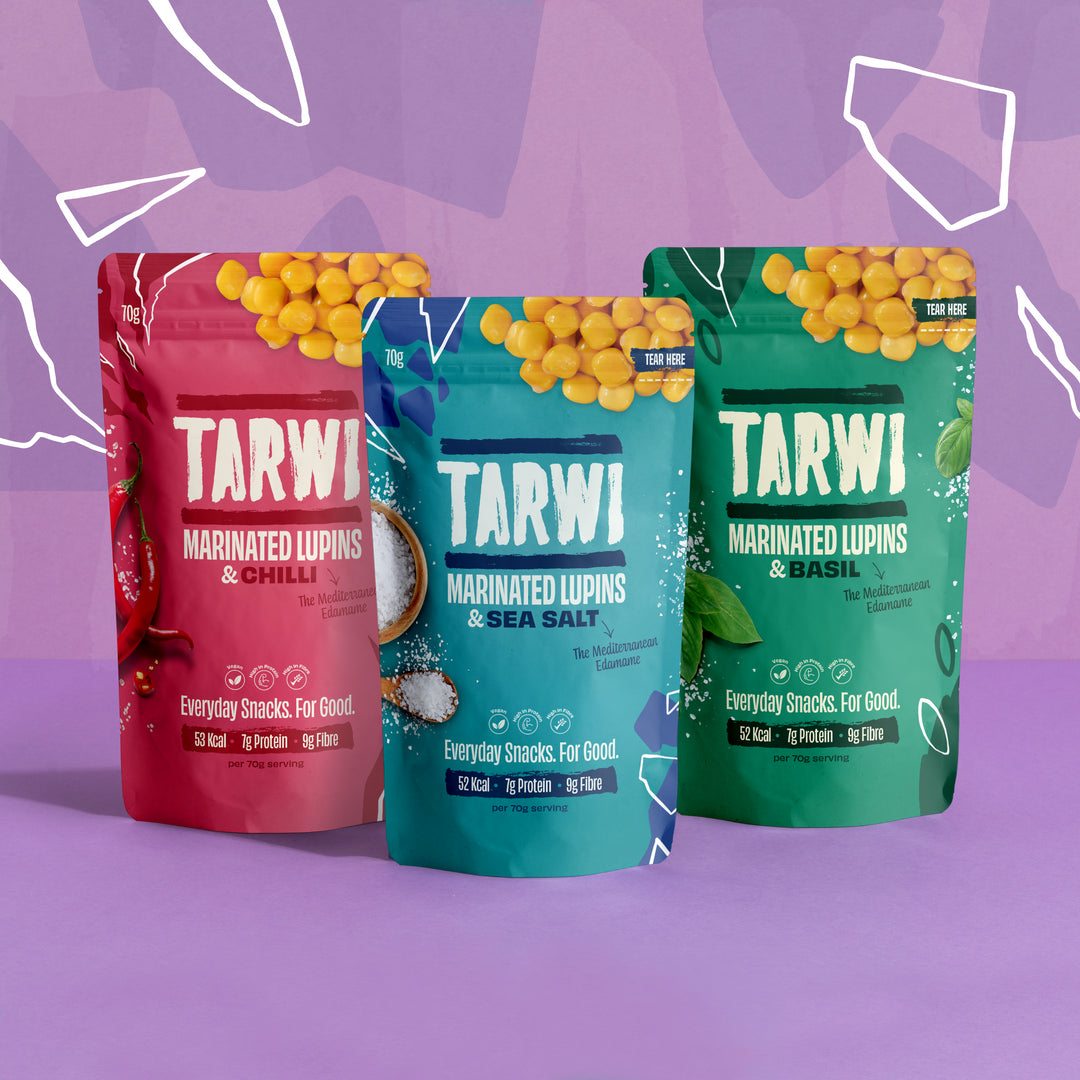FAQs
Lupins & Lectins
About Lupins
The earth's answer to plant protein.
Lupins, also known as lupines or lupini beans, are legumes consumed as a food source for thousands of years, particularly in the Mediterranean and Andean regions.
Lupins are known for their high protein content (30-40%) and fibre (about 30%) while being low in fat (4-7%) and carbohydrates. After soaking and cooking to remove bitterness, they become a versatile ingredient.
Because of their nutritional profile, lupins offer a great alternative to gluten, soy, or animal proteins.
The first tracks come from the Egyptians, who placed them in the tombs of the pharaohs. For the Greeks, lupins had propitiatory functions, while the Romans cultivated them and consumed them in large quantities instead of meat, exploiting their high energy and protein value.
Introduced to northern Europe in 1781 to improve poor soils, lupins' modern cultivation expanded in the early 20th century with the development of "sweet" varieties by German scientists.
Today, lupins are grown globally, with Australia being the largest producer.
We source Lupins from Western Australia, supporting regenerative farming practices.
European production is limited, so we're bridging gaps between farmers, academia, and industry to enhance it. We aim for 100% local sourcing in the future, a gradual process we're committed to.
The production of lupins involves a debittering process where the grain is boiled and subsequently subjected to extensive leaching in water to remove its alkaloids*. The process is cumbersome but done with all the care so that you can take advantage of this powerful bean's amazing nutritional benefits.
The traditional method of processing lupins involves the use of strong chemicals to ensure their long shelf life while keeping a low trade price. Because the use of chemicals goes against our values, we developed our own proprietary process so that only natural products are used in the treatment of the Tarwi lupins.
This means our lupins are slightly more expensive but higher quality. It also translates to a thinner shell (the outer case surrounding the bean), meaning our lupins can be enjoyed with the shell on, where all of their fibre content is found!
*Alkaloids are anti-nutrient compounds in the grain, notoriously bitter and toxic to humans and farm animals.
One challenge with plant-based nutrition is that some plants contain compounds that can affect nutrient absorption and cause digestive discomfort.
Unlike other legumes like peas, soybeans, and beans, lupins are low in these troublesome compounds, such as phytic acid, alkaloids, oligosaccharides, trypsin inhibitors, lectins, and saponins.
If you're seeking a whole food source of plant protein, lupins are an excellent choice. They offer up to twice the protein of most legumes (like lentils, peas, chickpeas, and beans) while keeping a very low carb count.
Unlike other plant-based proteins, lupins are also complete proteins, containing all 9 essential amino acids that can only be obtained from food.
Amino acids are the building blocks of proteins and are essential for numerous bodily functions, including muscle development, energy production, immune support, and hormone production.
There are 9 essential amino acids that must be obtained from food, 11 nonessential ones that the body can produce, and some that become essential during illness or stress.
Complete proteins (from meat, fish, eggs, and dairy) contain all essential amino acids, while plant-based sources may lack some. Deficiencies in amino acids can lead to health issues, so a balanced diet is important.
Unlike other plant-based proteins, lupins are also complete proteins, containing all 9 essential amino acids.
Lupin beans are considered gut-friendly due to their high prebiotic fibre content, which supports beneficial gut bacteria, and their low starch levels, making them easier to digest.
Unlike other legumes, lupins are also naturally low in anti-nutrient compounds such as lectins, making them less likely to cause digestive discomfort.
They also have anti-inflammatory properties from beta-glucans, are rich in protein for tissue repair, contain antioxidants that protect the gut, and promote satiety, helping to prevent overeating.
Lupins are legumes, not grains, and do not contain gluten naturally.
Fun fact: lupin flour is often used as a gluten-free substitute for wheat flour in various products!
Like other protein-containing foods (such as peanuts or soybeans), lupin beans might trigger an allergic reaction. It has been shown that people who are allergic to peanuts may react to lupins as well—please be mindful if that is your case!
Yes, our lupins are GMO-free.
About Lectins
The proteins that your body can't digest.
Lectins are defined as proteins that bind to carbohydrates. They are found in all plants, but raw legumes (beans, lentils, peas, soybeans, fava beans, chickpeas, and peanuts) and whole grains like wheat contain the highest amounts of lectins.
The same features that lectins use to defend plants in nature may cause problems during human digestion. They resist being broken down in the gut and are stable in acidic environments, features that protect lectin-containing plants in nature.
They’re everywhere, so you can’t really. And you don’t need to because not all lectins are harmful. They’re found in almost all organisms, including animals, microorganisms, and plants, where they are concentrated in seeds.
Lectins affect everyone, but some people react more vigorously to them. If you have an underlying digestive sensitivity, such as irritable bowel syndrome, you may be more likely to experience negative symptoms from eating lectins.
Below are some of the known impacts of lectins on digestibility:
- Interference with nutrient absorption: lectins can bind to the cells lining the digestive tract, potentially interfering with the absorption of nutrients, especially minerals like calcium, iron, phosphorus, and zinc.
- Resistance to digestion: lectins are highly resistant to digestive processes and may not be completely broken down in the gastrointestinal tract. This allows them to pass through the digestive system largely intact.
- Damage to intestinal lining: active lectins can cause damage to the brush border of the small intestine, leading to increased intestinal permeability (often referred to as "leaky gut").
- Disruption of gut flora: lectins may affect the growth and action of beneficial intestinal bacteria.
- Digestive discomfort: consuming foods high in active lectins, especially undercooked legumes, can cause digestive symptoms like nausea, vomiting, stomach upset, and diarrhoea.
- Reduced enzyme activity: lectins can bind to digestive enzymes, potentially reducing their activity and further impacting digestion.
- Inflammation: lectins can activate white blood cells in the gut, promoting inflammation.
It's important to note that symptoms can vary from person to person, and some individuals may be more sensitive to lectins than others. Additionally, the severity of symptoms can depend on the amount and types of lectin-containing foods consumed. If you suspect lectin sensitivity, it's advisable to consult with a healthcare professional for proper diagnosis and management.
Common symptoms are:
- Digestive issues, such as gas, bloating, and flatulence, diarrhoea or constipation (often alternating), indigestion and reflux, abdominal cramps, nausea and vomiting
- Fatigue and energy-related symptoms, such as brain fog and general fatigue
- Mood and neurological symptoms, such as anxiety, depression, and insomnia
- Skin issues, such as rashes
- Joint pain
- Inflammation
The impact of lectins on digestibility can be significantly reduced through proper food preparation, as lectins are inactivated by boiling or pressure-cooking. They aren’t destroyed by microwaving, baking, or roasting.
While cooking significantly reduces lectin content, it may not completely eliminate all lectins in every case. That is why some people still experience digestive issues such as gas and bloating when consuming legumes.
It is important to note that, for most people, properly cooked foods containing lectins are safe to consume and can be part of a healthy diet. The health benefits of many lectin-containing foods, such as beans, whole grains, and vegetables, often outweigh the potential risks associated with their lectin content when properly prepared.
Lupin seeds contain small amounts of lectins (3 × 10–5 HU, i.e. hemaglutination activity units) compared to e.g. common bean (840 × 10–5 HU) (Nachbar & Oppenheim 1980) or they are not detectable at all (Petterson & Fairbrother 1996).
Our Products
Lummus
The low carb dip you didn't know you needed.
Lummus is our take on traditional hummus, where we swap chickpeas for lupins. The result? A dip that is high in protein and fibre, with half the kcals and fat of traditional hummus and 0g carbs (and equally delicious!).
We love Hummus, but we wanted something more versatile and lighter—a versatile topping for any dish that naturally adds flavour and protein to meals.
Hummus is great (and we love it) but is high in carbohydrates and fat, making it harder to digest. We wanted to offer you an equally delicious high-protein alternative.
Using lupins gives Lummus a whipped-like texture, making it a very versatile product. You can use it as a dip, spread, or base to create high-protein dressings and sauces, or simply add a dollop to your bowls or veggies.
Check our recipe hub here for recipe inspo!
Our Lummus is preserved by leveraging High-Pressure Pasteurisation (HPP) technology.
HPP is a cold processing technique based on the application of high levels of pressure transmitted by water.
It extends the shelf life of our products to 80 days (vs. the category average of 30 days) without preservatives.
Because we only use high-quality, all-natural ingredients, Lummus is safe to give to children, assuming your child is not allergic or intolerant to any of the ingredients listed on the ingredient list.
Please note that our Lummus is produced in a factory that handles gluten, crustaceans, eggs, fish, soya, milk, nuts, mustard, and sulphites. Even though our Lummus is naturally plant-based, gluten-free, and soy-free, cross-contamination may occur.
Because we only use high-quality, all-natural ingredients, Lummus is safe to consume when pregnant, assuming you are not allergic or intolerant to any of the ingredients listed on the ingredient list.
Our Lummus contains the following allergens:
Lupins: Like other protein-containing foods (such as peanuts or soybeans), lupin beans might trigger an allergic reaction. It has been shown that people who are allergic to peanuts may react to lupins as well—please be mindful if that is your case!
Sesame (Tahini): The Original Lummus and Lummus & Basil units contain Tahini, which are ground sesame seeds. If you are allergic to sesame, please be mindful. The Lummus & Sun-dried Tomate and Lummus & Beets flavours do not contain Tahini.
Please note that our Lummus is produced in a factory that handles gluten, crustaceans, eggs, fish, soya, milk, nuts, mustard, and sulphites. Even though our Lummus is naturally plant-based, gluten-free, and soy-free, cross-contamination may occur.
Marinated Lupins
A snack like you've never seen before.
Inspired by our roots, we launched our Marinated Lupins: the Mediterranean response to Edamame!
Each pack has the same macronutrient profile as one boiled egg but with 9x more fibre. The best part? It is only the pickled lupin with natural flavouring and sea salt. That’s it!
Lupins are traditionally consumed in pickled form in Southern Europe, Southern America, and the Middle East. They are cooked and preserved in brine (salted water with added chemicals) in large jars. They are then served as a snack, mainly as a pairing to beer.
Lupins are a delicious and nutritious snack, but how they are processed and preserved hasn’t been adjusted to the modern consumer.
We wanted a versatile snack that could be consumed anytime, anywhere. So, we found a way to remove the brine and pack it in a pouch that you can easily take anywhere!
Unlike other packaged snacks, our Marinated Lupins are not dry or crunchy. We like to describe them as having the texture of an Edamame, with a tang of a salty pickle!
Because of our processing method when treating our lupins (read all about it here), our Marinated Lupins have a thinner shell compared to the traditional offering. This means that eating the shell is not only safe but also enjoyable.
As a bonus, all the fibre content is found in the shell, so you will miss out on all the gut-health benefits of lupins if you decide to remove it!
You can eat it straight out of the pack as a snack or add it as a protein top-up to your meals.
If you want to get creative, check our recipe hub here for recipe inspo!
Because we only use high-quality, all-natural ingredients, our Marinated Lupins are safe to give to children, assuming your child is not allergic or intolerant to any of the ingredients listed on the ingredient list.
Please note that our Marinated Lupins are produced in a factory that handles gluten, soya, milk, and nuts. Even though our Marinated Lupins are naturally plant-based, gluten-free, nut-free, and soy-free, cross-contamination may occur.
Because we only use high-quality, all-natural ingredients, our Marinated Lupins are safe to consume when pregnant, assuming you are not allergic or intolerant to any of the ingredients listed on the ingredient list.
Like other protein-containing foods (such as peanuts or soybeans), lupin beans might trigger an allergic reaction. It has been shown that people who are allergic to peanuts may react to lupins as well—please be mindful if that is your case!
Please note that our Marinated Lupins are produced in a factory that handles gluten, soya, milk, and nuts. Even though our Marinated Lupins are naturally plant-based, gluten-free, nut-free, and soy-free, cross-contamination may occur.
Protein powder
Curious to know what sets our Protein Powder apart? Keep reading.
Unlike other proteins, our lupin protein powder doesn’t go through an isolation process, meaning you get a complete protein (instead of a protein isolate, as the traditional market offers).
Because we don’t isolate one macronutrient, you benefit from all the other micronutrients from lupins: magnesium, iron, folate, vitamin B9, vitamin E, phosphorus, potassium, and zinc.
In all honesty? Because we couldn’t find a plant protein powder that met our needs.
Plant protein powders are known for their strong aftertaste, are usually highly processed, and have an artificial flavour. They are also extremely hard to digest.
We wanted to create a minimally processed, all-natural alternative that wouldn’t leave you bloated and that would actually taste good.
Because we leverage the whole lupin seed, we can create a minimally processed, easily digestible, complete protein powder with only five ingredients and up to six times more dietary fibre than the market’s offering.
Minimally processed: our lupins don’t go through an isolation process, so you benefit from all its micronutrients.
Easily digestible: our protein is 90% lupin powder. As mentioned here, lupins are naturally lectin-free and low in anti-nutrient compounds, making our protein easier to digest.
Complete protein: unlike other legumes, lupins contain all 9 essential amino acids. Read more about it here.
Protein is essential for numerous physiological functions. Enzymes, which are protein-based, facilitate chemical reactions like digesting food, replicating DNA, and detoxifying the liver. Proteins are also crucial for the health of muscles, hair, nails, bones, and skin.
In theory, you should be able to get all the protein you need from whole food sources, like meat, fish, dairy, and pulses, but that’s often easier said than done.
For example:
- If you’re a busy person, protein supplements can be a super convenient way to meet your nutritional goals.
- If you’re a very active person, they can help you meet your higher protein needs.
- If you simply love the taste, they can help you enjoy your meals even more, like in smoothies, porridge, or cakes.
- If you are an older adult, you may consume too little protein, which can contribute to muscle loss as you age.
- Also, a significant proportion of people in long-term care and some people with cancer have protein deficiency.
So, while not everyone needs a protein supplement or any supplement, they can be useful additions to a healthy diet.
Anytime, really! You can have it:
- as a whole food substitute in your main meals if you’re in a hurry or without time to cook,
- or as a replacement in meals that tend to be higher in carbohydrates (such as breakfast and snacks), so you have a more balanced meal.
You can simply stir it in water, milk or your juice of choice, add it to smoothies, porridges or yoghurts, or get creative in your cooking.
Check our recipe hub here for recipe inspo!
Depends on the use, really.
- If you are stirring it with water, milk or juice, we recommend 2 tablespoons with 250ml of liquid
- If you are adding it to yoghurts or porridge, we recommend 1 tablespoon to 1 serving ration
- If you are using it as a replacement for baked goods, we recommend following the recipe guidelines. We test all our recipes before sharing them with you, so follow our portion recommendations!
That being said, you should adjust the serving quantity based on your preferences (taste and texture).
As a reference, a serving 45g of Tarwi’s protein powder = 20g of protein.
Because we only use high-quality, all-natural ingredients, our Protein Powder is safe to give to children, assuming your child is not allergic or intolerant to any of the ingredients listed on the ingredient list.
We like to think of it as a replacement for ultra-processed foods that are usually offered to children, such as:
- Flavoured yoghurts, that are usually packed with sugars and preservatives. Simply stir 1 teaspoon of Vanilla or Rich Cocoa protein powder into 1 portion of all-natural yoghurt, and you have a delicious yoghurt.
- Juices, even 100% fruit juices, are very high in sugar. To balance the drink with fibre and protein, simply stir 1 teaspoon of Pure Lupin protein into 1 cup of juice. This will prevent a harmful glucose spike.
- Chocolate and other flavoured milks that children love are packed with sugars and preservatives. Stir 1 tablespoon of Vanilla or Rich Cocoa protein powder into 250ml of milk, and you have a delicious, healthy alternative.
Because we only use high-quality, all-natural ingredients, our Protein Powder is safe to consume when pregnant, assuming you are not allergic or intolerant to any of the ingredients listed on the ingredient list.
Like other protein-containing foods (such as peanuts or soybeans), lupin beans might trigger an allergic reaction. It has been shown that people who are allergic to peanuts may react to lupins as well—please be mindful if that is your case!
Please note that our Protein Powder is produced in a gluten-free factory environment. Our Protein Powder is also soy-free and GMO-free.
Meet Tarwi
The Team
All you need to know about us.
Tarwi was created by friends in love with food and conscious living. Meet the team behind Tarwi, here.
We are a remote team spread across rainy London, beautiful Lisbon, and sunny Portimão (Algarve).
Our Story
From a Corporate Job to selling lupins for a living.
👋 Cata here — it would be easier to explain if I shared my story with you!
In 2016, I decided to go vegan. I loved it, but I really struggled to find a perfect plant protein source for my meals. Chickpeas, lentils, and black beans would leave me feeling bloated and without energy. So, I was forced to turn to soy, which came at a sustainability cost that I didn’t love.
On this journey, I came across an amazing ingredient: something that met all my protein needs. Funnily enough, I grew up eating it without knowing how incredible it was.
As you might have guessed, that secret ingredient was the amazing lupin bean—one of the best and most sustainable plant-based proteins on the planet.
If you have ever been to Portugal, Spain or Italy, you might have tried it - it is very engrained in our culture to snack on lupins when drinking a nice cold beer 😊
Everyone knows about it, but no one does, really: I grew up thinking it was unhealthy because of its association with beer! When, in reality, they have:
- double the protein and fibre of most legumes
- a complete amino acid profile
- little to no fat and carbohydrates
- and it is lectin-free (lectins are the proteins found in legumes known to cause bloating and indigestion).
It felt like I had stumbled upon a secret superfood that no one knew existed, so I decided to quit my job and start Tarwi, a brand on a mission to normalise access to healthier foods that give back to the environment.
Lupins are legumes consumed as a food source for thousands of years, particularly in the Mediterranean and Andean regions.
The name "Tarwi" originates from South America, specifically the Andean region. Indigenous communities in the Andes have used it to refer to lupin.
We loved how it resonated with lupins without being so restrictive to the legume, so we decided to go with it and see it as a way to honour its origins.
Lupins are yellow and grow in beautiful white, blue and purple flowers. Because our focus is on hero-ing lupins, we opted to focus on yellow and purple as the primary colours of the brand.
Lupins have been traditionally consumed as snacks in Southern Europe, Southern America, Egypt, and Lebanon. Despite being ingrained in their culture, only a few locals know about their nutritional properties.
We wanted to create diverse moments of consumption where protein is the primary driver so that consumers start knowing (and seeing) lupins as an incredible source of plant protein.
Your Order
Money-back guarantee
Order risk-free.
We all know how important it is to try a product before you buy it.
Because that is quite hard to do online, and because we want to encourage you to try our products, we will offer you a refund if, within 30 days of your date of purchase, you let us know that our product didn’t suit your taste.
We are pretty confident you will like it, but hey—taste is subjective!
Reach out to us at hello@tarwi.co.uk, and we will process your refund.
Shipping & Delivery
All you need to know about your delivery.
We ship across the majority of European countries and within the UK.
Please refer here for more details on our shipping and delivery policies.
Yes, we do offer free delivery above specific minimum order quantities. These values vary depending on the shipping destination. Please refer here for a full breakdown.
Email us at hello@tarwi.co.uk, and we will reply within 48 hours.




























































